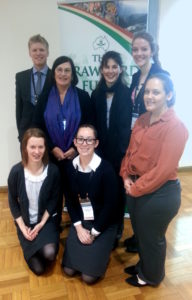
2014 Young Scholar: Mardee Cassin

Front: Julia de Bruyn, Katherine Ashley, Kirsty McCormack
Mardee Cassin
University of Sydney
Sponsored by the NSW Committee
Mardee Cassin is a third year full time student at the University of Sydney, currently undertaking a Bachelor of Environmental Systems. She endeavours to continue her studies with an honours year in 2015. She is particularly interested in sustainable farming systems, especially in developing countries with a main focus on Asia, ignited by many previous visits, along with recognising it as the continent with largest population. She is therefore very much looking forward to hearing the perspectives of many esteemed environmentalists on the topic of “Feeding the 9 billion Well”, as well as conversing with those who share a similar passion.
Conference report
The Crawford Fund’s Conference gave me a renewed enthusiasm in my studies, as well as a new appreciation of agricultural research…”
The Crawford Fund’s 2014 Parliamentary Conference was an enriching experience. It was my first time attending an international conference. This made the topic of ‘Ethics, Efficiency and Food Security: Feeding the 9 billion, Well’ all the more interesting; hearing various aspects of the issue from not only differing occupational perspectives, but also differing cultural backgrounds. Expanding my current knowledge of current challenges, priorities and progress in the area of food security, topics including: nutritional security, food waste, women status, market opportunities, high production costs for Australian farmers and controversial issues of biofuels and genetically modified technologies were discussed. These topics were discussed from a global to grass roots perspective.
Dr Norah Omot, the Director of the Enabling Environment Programme of the Papua New Guinea National Agricultural Research Institute was a particular highlight. She presented a clear view of the food security status in Papua New Guinea and presented current mechanisms which are being run by the Programme to help steer communities towards improved health and sustainable living. One such issue being addressed is food nutrition. Via interviews and surveys among numerous villages, it was observed that noodles were regarded as a source of protein (which is not the case, as we know). This was due to the noodle packaging involving images of chickens and cattle. Dr Omot highlighted that a simple change in the packaging, alongside community education programs about food nutrition was significantly improving health in many of the New Guinean villages. I found it intriguing that a simple adjustment, such as the food packaging, could have such an impact! This really stood out to me, as I hope, with my current degree in a Bachelor of Environmental Systems at Sydney University, to be able to work alongside communities in developing countries with the prospect of increasing the sustainability of their agricultural systems, and in effect, sustain family health and village livelihoods. Although my ambition seems rather vast, hearing Dr Omot talk of her experiences and the projects that are being undertaken, or in the process of being developed, gave me assurance of the positive impact and progress that can still be made, even though the future prospect of food security for the globe seems desolate.
As well as hearing many esteemed academics talk on the topic of food security, another aspect of the conference which I also valued was networking with scientists from different regions of the globe; from fellow undergraduates to post-graduates and experienced researchers. It was enthralling to meet so many like-minded people and it gave me a broader understanding of international agricultural research. Upon hearing the many challenges such as language barriers, cultural misunderstandings, isolation and data errors, it was particularly encouraging to be introduced to Researchers in Agriculture for International Development (RAID) and know that there is a support network to help students involved in all stages in international agricultural research.
Since attending the conference I have decided to continue my university studies into an honours year. My project will be based on a food and nutrition security project based in Tanzania, and is funded by the Australian Centre for International Agriculture Research (ACIAR). The Crawford Conference was my first exposure to agricultural research, and to ACIAR. It was all thanks to the conference that I was able to meet the PhD and honour students who are currently working on this project. They invited me to listen in on their exchange of experiences in research and aid development in Africa over dinner. It was a great asset to hear what agricultural research really involves in the field, especially in light of what I am now embarking on next year!
The Crawford Fund’s Conference gave me a renewed enthusiasm in my studies, as well as a new appreciation of agricultural research, hearing of aspects of food security that I had never been exposed to before. I thank the Crawford Fund for this fantastic and eye-opening opportunity, and I thoroughly look forward to the prospect of being involved with further events held by the Fund in the future.
